History Essay: Exploring Medieval Culture in Dante's Inferno
VerifiedAdded on 2023/03/21
|6
|1756
|53
Essay
AI Summary
This essay analyzes Dante Alighieri's Inferno, the first part of the Divine Comedy, to explore key aspects of medieval culture. The essay focuses on three main themes: the medieval concept of hell as a metaphor for sin and punishment, the significance of art during the medieval period, and the importance of purgatory and paradise in the afterlife. The analysis examines how Dante uses these themes to reflect the beliefs, values, and societal structures of the medieval world. The essay references Dante's descriptions of hell, the role of art in representing religious and societal values, and the concepts of sin, judgment, and redemption within the context of the poem. The conclusion highlights the accuracy with which Inferno represents the medieval civilization.
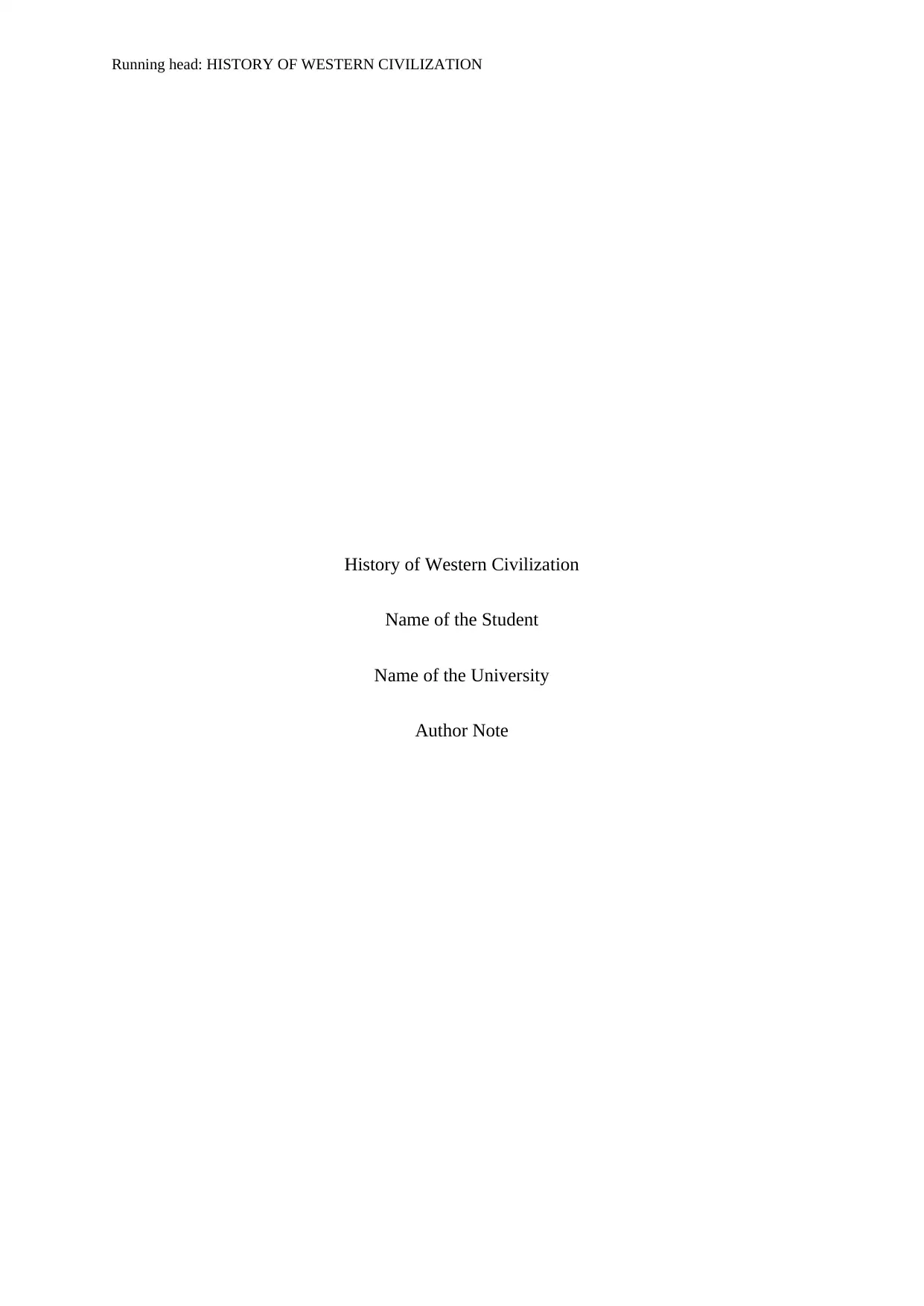
Running head: HISTORY OF WESTERN CIVILIZATION
History of Western Civilization
Name of the Student
Name of the University
Author Note
History of Western Civilization
Name of the Student
Name of the University
Author Note
Paraphrase This Document
Need a fresh take? Get an instant paraphrase of this document with our AI Paraphraser
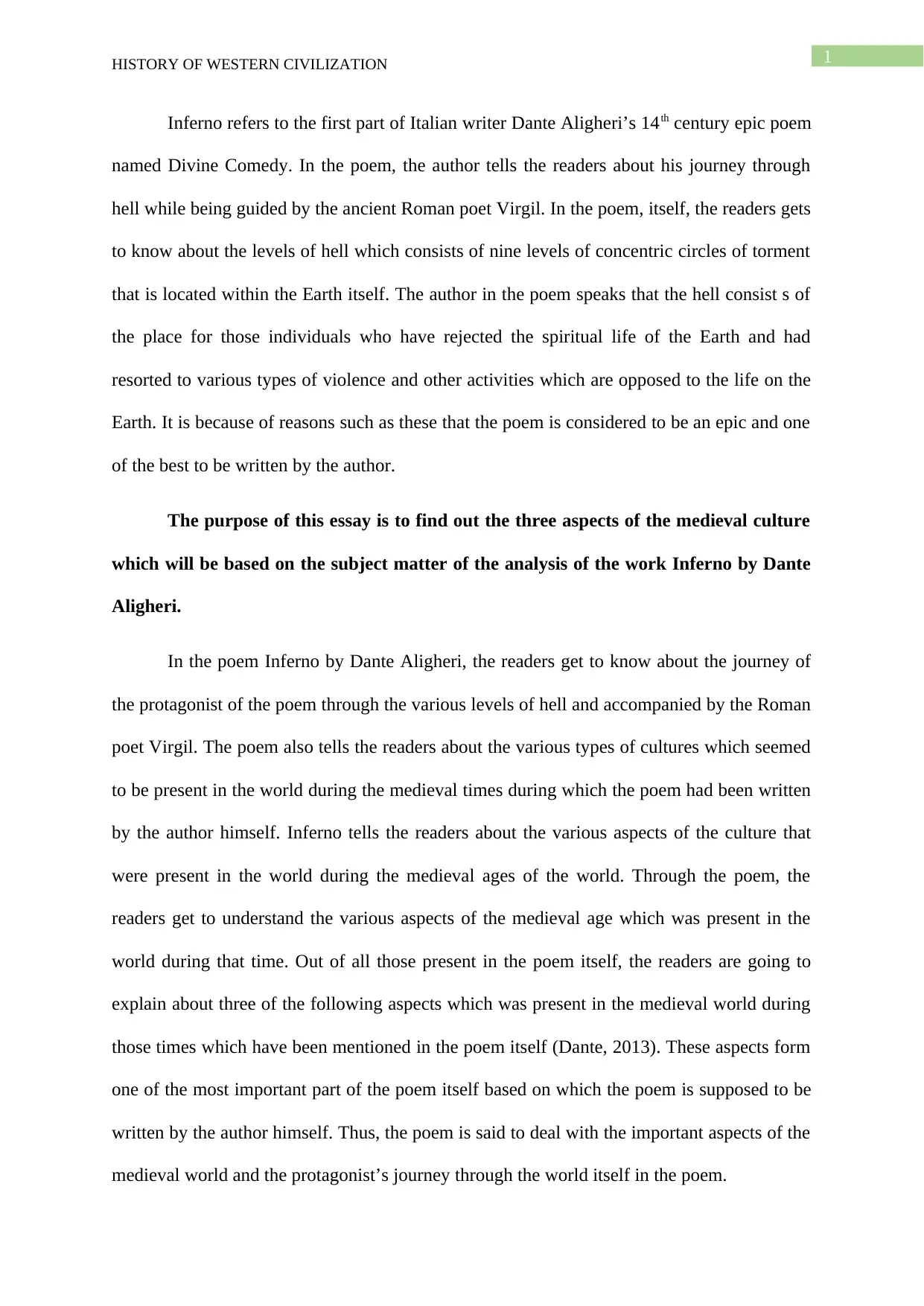
1HISTORY OF WESTERN CIVILIZATION
Inferno refers to the first part of Italian writer Dante Aligheri’s 14th century epic poem
named Divine Comedy. In the poem, the author tells the readers about his journey through
hell while being guided by the ancient Roman poet Virgil. In the poem, itself, the readers gets
to know about the levels of hell which consists of nine levels of concentric circles of torment
that is located within the Earth itself. The author in the poem speaks that the hell consist s of
the place for those individuals who have rejected the spiritual life of the Earth and had
resorted to various types of violence and other activities which are opposed to the life on the
Earth. It is because of reasons such as these that the poem is considered to be an epic and one
of the best to be written by the author.
The purpose of this essay is to find out the three aspects of the medieval culture
which will be based on the subject matter of the analysis of the work Inferno by Dante
Aligheri.
In the poem Inferno by Dante Aligheri, the readers get to know about the journey of
the protagonist of the poem through the various levels of hell and accompanied by the Roman
poet Virgil. The poem also tells the readers about the various types of cultures which seemed
to be present in the world during the medieval times during which the poem had been written
by the author himself. Inferno tells the readers about the various aspects of the culture that
were present in the world during the medieval ages of the world. Through the poem, the
readers get to understand the various aspects of the medieval age which was present in the
world during that time. Out of all those present in the poem itself, the readers are going to
explain about three of the following aspects which was present in the medieval world during
those times which have been mentioned in the poem itself (Dante, 2013). These aspects form
one of the most important part of the poem itself based on which the poem is supposed to be
written by the author himself. Thus, the poem is said to deal with the important aspects of the
medieval world and the protagonist’s journey through the world itself in the poem.
Inferno refers to the first part of Italian writer Dante Aligheri’s 14th century epic poem
named Divine Comedy. In the poem, the author tells the readers about his journey through
hell while being guided by the ancient Roman poet Virgil. In the poem, itself, the readers gets
to know about the levels of hell which consists of nine levels of concentric circles of torment
that is located within the Earth itself. The author in the poem speaks that the hell consist s of
the place for those individuals who have rejected the spiritual life of the Earth and had
resorted to various types of violence and other activities which are opposed to the life on the
Earth. It is because of reasons such as these that the poem is considered to be an epic and one
of the best to be written by the author.
The purpose of this essay is to find out the three aspects of the medieval culture
which will be based on the subject matter of the analysis of the work Inferno by Dante
Aligheri.
In the poem Inferno by Dante Aligheri, the readers get to know about the journey of
the protagonist of the poem through the various levels of hell and accompanied by the Roman
poet Virgil. The poem also tells the readers about the various types of cultures which seemed
to be present in the world during the medieval times during which the poem had been written
by the author himself. Inferno tells the readers about the various aspects of the culture that
were present in the world during the medieval ages of the world. Through the poem, the
readers get to understand the various aspects of the medieval age which was present in the
world during that time. Out of all those present in the poem itself, the readers are going to
explain about three of the following aspects which was present in the medieval world during
those times which have been mentioned in the poem itself (Dante, 2013). These aspects form
one of the most important part of the poem itself based on which the poem is supposed to be
written by the author himself. Thus, the poem is said to deal with the important aspects of the
medieval world and the protagonist’s journey through the world itself in the poem.
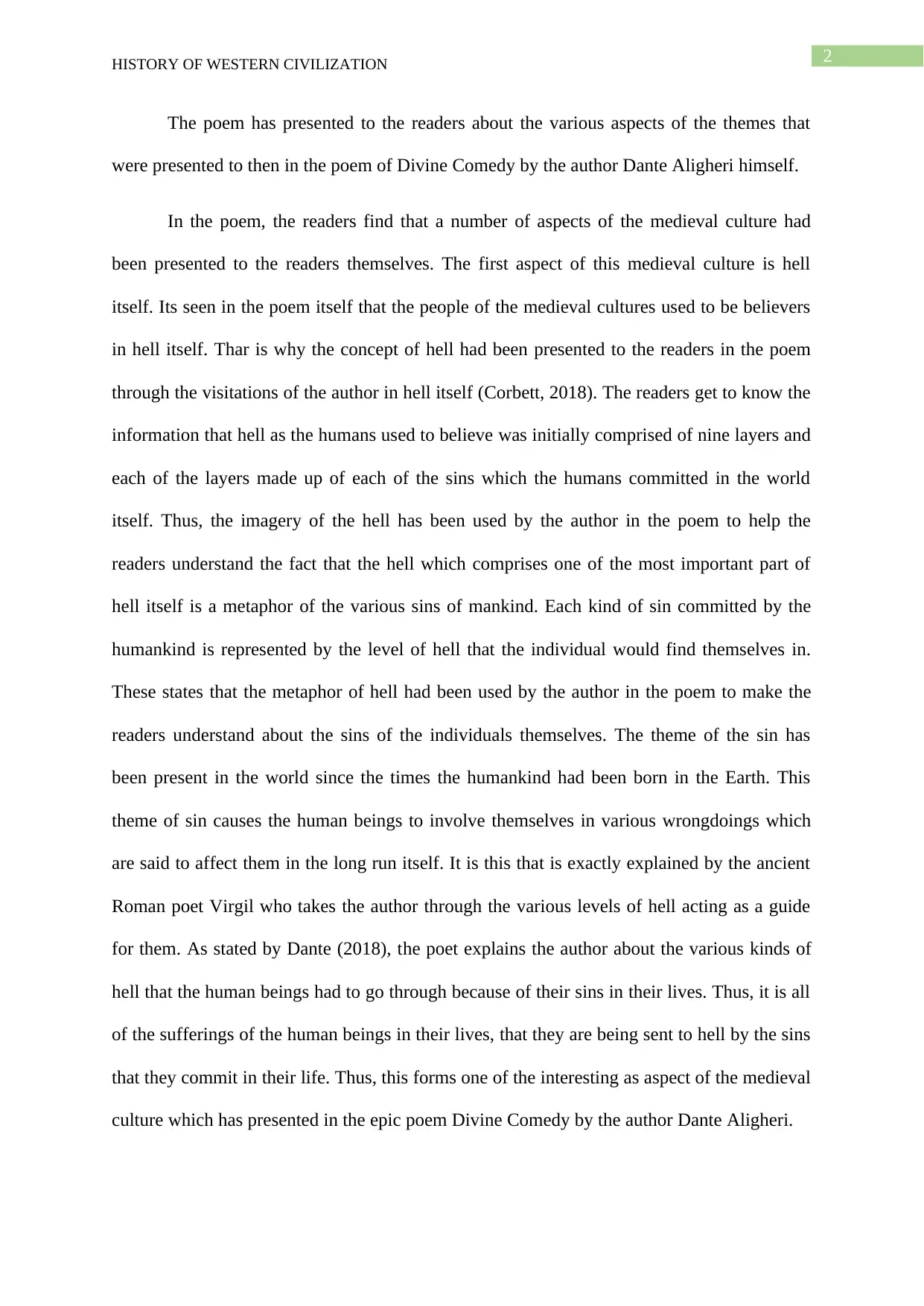
2HISTORY OF WESTERN CIVILIZATION
The poem has presented to the readers about the various aspects of the themes that
were presented to then in the poem of Divine Comedy by the author Dante Aligheri himself.
In the poem, the readers find that a number of aspects of the medieval culture had
been presented to the readers themselves. The first aspect of this medieval culture is hell
itself. Its seen in the poem itself that the people of the medieval cultures used to be believers
in hell itself. Thar is why the concept of hell had been presented to the readers in the poem
through the visitations of the author in hell itself (Corbett, 2018). The readers get to know the
information that hell as the humans used to believe was initially comprised of nine layers and
each of the layers made up of each of the sins which the humans committed in the world
itself. Thus, the imagery of the hell has been used by the author in the poem to help the
readers understand the fact that the hell which comprises one of the most important part of
hell itself is a metaphor of the various sins of mankind. Each kind of sin committed by the
humankind is represented by the level of hell that the individual would find themselves in.
These states that the metaphor of hell had been used by the author in the poem to make the
readers understand about the sins of the individuals themselves. The theme of the sin has
been present in the world since the times the humankind had been born in the Earth. This
theme of sin causes the human beings to involve themselves in various wrongdoings which
are said to affect them in the long run itself. It is this that is exactly explained by the ancient
Roman poet Virgil who takes the author through the various levels of hell acting as a guide
for them. As stated by Dante (2018), the poet explains the author about the various kinds of
hell that the human beings had to go through because of their sins in their lives. Thus, it is all
of the sufferings of the human beings in their lives, that they are being sent to hell by the sins
that they commit in their life. Thus, this forms one of the interesting as aspect of the medieval
culture which has presented in the epic poem Divine Comedy by the author Dante Aligheri.
The poem has presented to the readers about the various aspects of the themes that
were presented to then in the poem of Divine Comedy by the author Dante Aligheri himself.
In the poem, the readers find that a number of aspects of the medieval culture had
been presented to the readers themselves. The first aspect of this medieval culture is hell
itself. Its seen in the poem itself that the people of the medieval cultures used to be believers
in hell itself. Thar is why the concept of hell had been presented to the readers in the poem
through the visitations of the author in hell itself (Corbett, 2018). The readers get to know the
information that hell as the humans used to believe was initially comprised of nine layers and
each of the layers made up of each of the sins which the humans committed in the world
itself. Thus, the imagery of the hell has been used by the author in the poem to help the
readers understand the fact that the hell which comprises one of the most important part of
hell itself is a metaphor of the various sins of mankind. Each kind of sin committed by the
humankind is represented by the level of hell that the individual would find themselves in.
These states that the metaphor of hell had been used by the author in the poem to make the
readers understand about the sins of the individuals themselves. The theme of the sin has
been present in the world since the times the humankind had been born in the Earth. This
theme of sin causes the human beings to involve themselves in various wrongdoings which
are said to affect them in the long run itself. It is this that is exactly explained by the ancient
Roman poet Virgil who takes the author through the various levels of hell acting as a guide
for them. As stated by Dante (2018), the poet explains the author about the various kinds of
hell that the human beings had to go through because of their sins in their lives. Thus, it is all
of the sufferings of the human beings in their lives, that they are being sent to hell by the sins
that they commit in their life. Thus, this forms one of the interesting as aspect of the medieval
culture which has presented in the epic poem Divine Comedy by the author Dante Aligheri.
⊘ This is a preview!⊘
Do you want full access?
Subscribe today to unlock all pages.

Trusted by 1+ million students worldwide
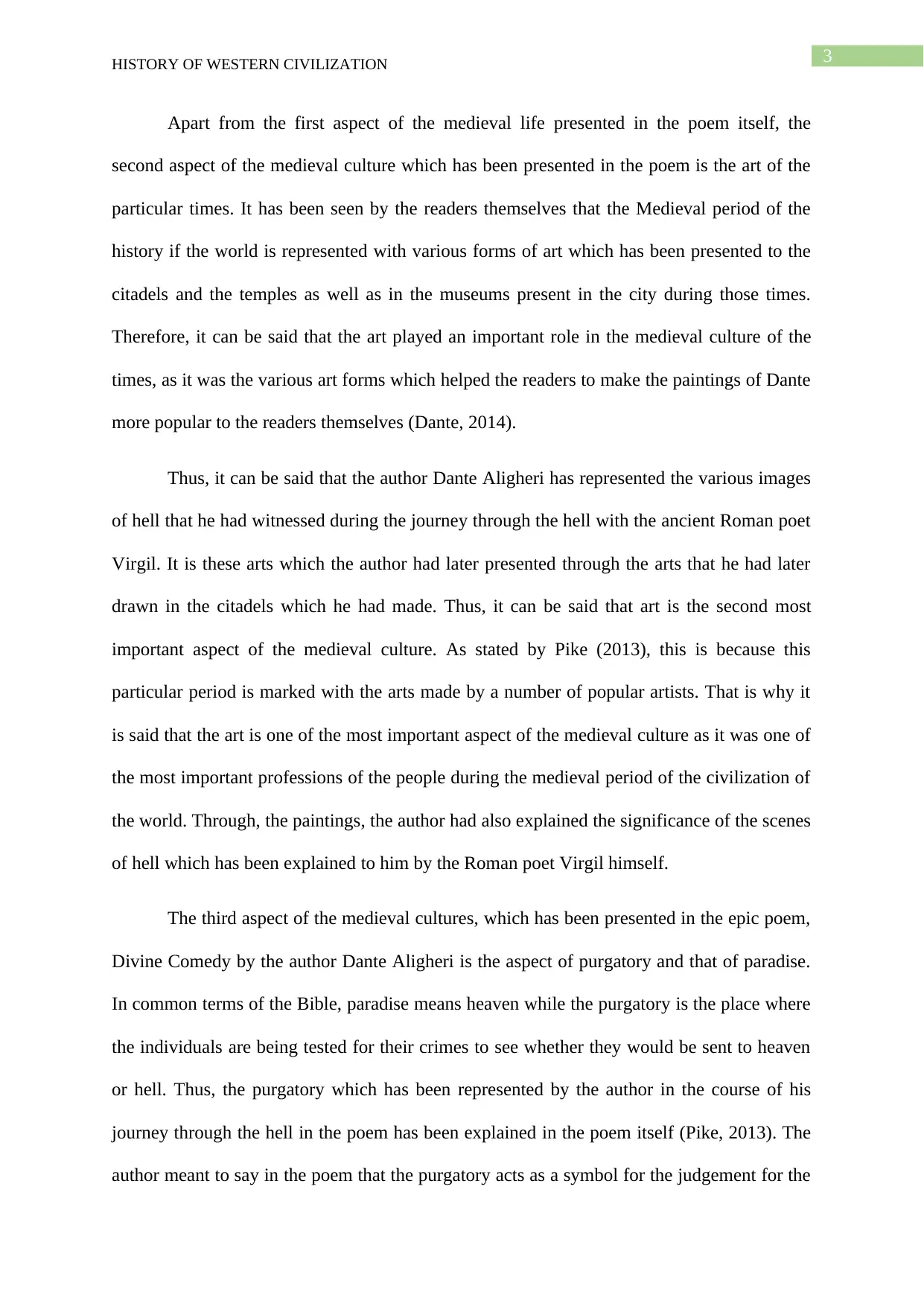
3HISTORY OF WESTERN CIVILIZATION
Apart from the first aspect of the medieval life presented in the poem itself, the
second aspect of the medieval culture which has been presented in the poem is the art of the
particular times. It has been seen by the readers themselves that the Medieval period of the
history if the world is represented with various forms of art which has been presented to the
citadels and the temples as well as in the museums present in the city during those times.
Therefore, it can be said that the art played an important role in the medieval culture of the
times, as it was the various art forms which helped the readers to make the paintings of Dante
more popular to the readers themselves (Dante, 2014).
Thus, it can be said that the author Dante Aligheri has represented the various images
of hell that he had witnessed during the journey through the hell with the ancient Roman poet
Virgil. It is these arts which the author had later presented through the arts that he had later
drawn in the citadels which he had made. Thus, it can be said that art is the second most
important aspect of the medieval culture. As stated by Pike (2013), this is because this
particular period is marked with the arts made by a number of popular artists. That is why it
is said that the art is one of the most important aspect of the medieval culture as it was one of
the most important professions of the people during the medieval period of the civilization of
the world. Through, the paintings, the author had also explained the significance of the scenes
of hell which has been explained to him by the Roman poet Virgil himself.
The third aspect of the medieval cultures, which has been presented in the epic poem,
Divine Comedy by the author Dante Aligheri is the aspect of purgatory and that of paradise.
In common terms of the Bible, paradise means heaven while the purgatory is the place where
the individuals are being tested for their crimes to see whether they would be sent to heaven
or hell. Thus, the purgatory which has been represented by the author in the course of his
journey through the hell in the poem has been explained in the poem itself (Pike, 2013). The
author meant to say in the poem that the purgatory acts as a symbol for the judgement for the
Apart from the first aspect of the medieval life presented in the poem itself, the
second aspect of the medieval culture which has been presented in the poem is the art of the
particular times. It has been seen by the readers themselves that the Medieval period of the
history if the world is represented with various forms of art which has been presented to the
citadels and the temples as well as in the museums present in the city during those times.
Therefore, it can be said that the art played an important role in the medieval culture of the
times, as it was the various art forms which helped the readers to make the paintings of Dante
more popular to the readers themselves (Dante, 2014).
Thus, it can be said that the author Dante Aligheri has represented the various images
of hell that he had witnessed during the journey through the hell with the ancient Roman poet
Virgil. It is these arts which the author had later presented through the arts that he had later
drawn in the citadels which he had made. Thus, it can be said that art is the second most
important aspect of the medieval culture. As stated by Pike (2013), this is because this
particular period is marked with the arts made by a number of popular artists. That is why it
is said that the art is one of the most important aspect of the medieval culture as it was one of
the most important professions of the people during the medieval period of the civilization of
the world. Through, the paintings, the author had also explained the significance of the scenes
of hell which has been explained to him by the Roman poet Virgil himself.
The third aspect of the medieval cultures, which has been presented in the epic poem,
Divine Comedy by the author Dante Aligheri is the aspect of purgatory and that of paradise.
In common terms of the Bible, paradise means heaven while the purgatory is the place where
the individuals are being tested for their crimes to see whether they would be sent to heaven
or hell. Thus, the purgatory which has been represented by the author in the course of his
journey through the hell in the poem has been explained in the poem itself (Pike, 2013). The
author meant to say in the poem that the purgatory acts as a symbol for the judgement for the
Paraphrase This Document
Need a fresh take? Get an instant paraphrase of this document with our AI Paraphraser
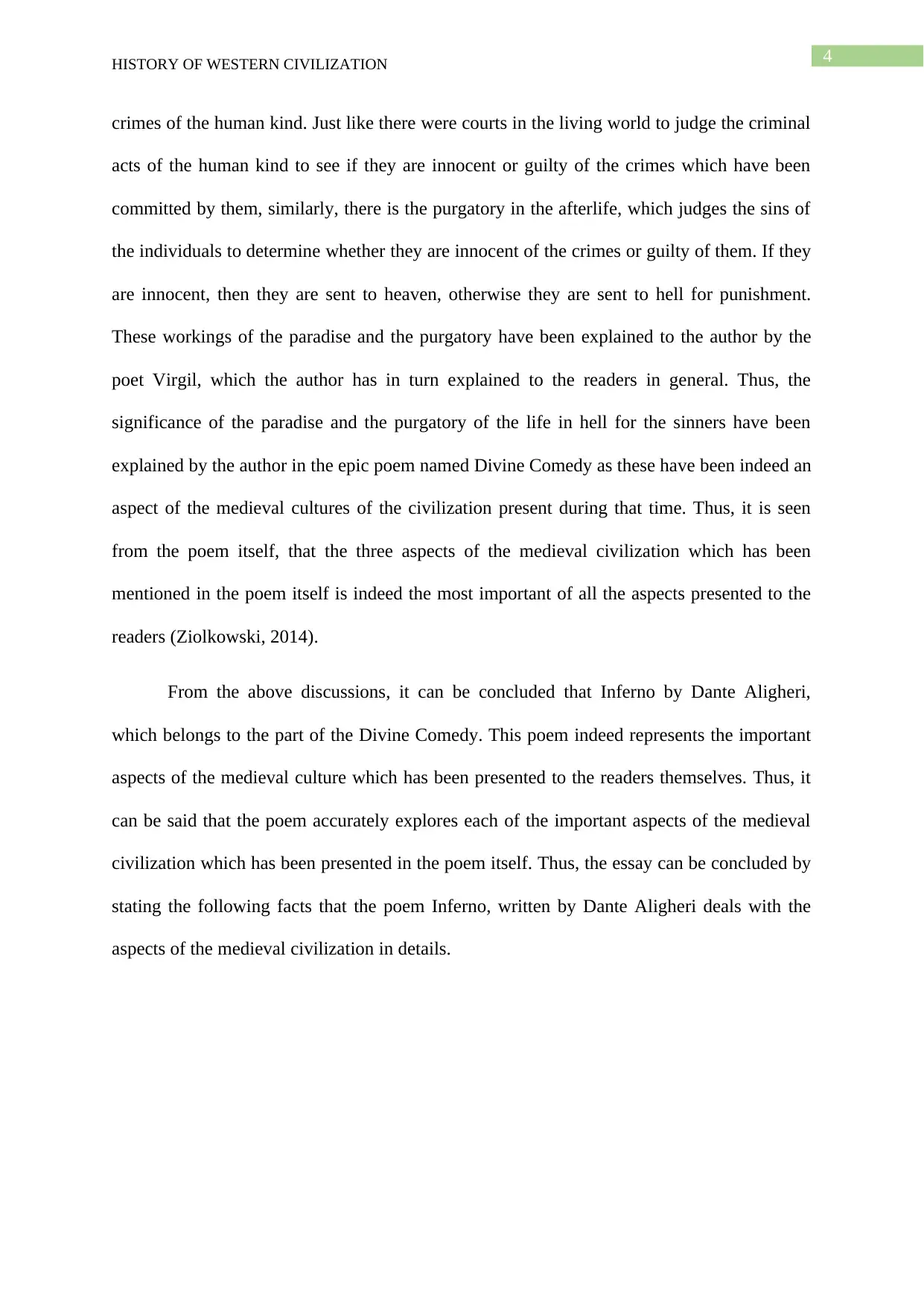
4HISTORY OF WESTERN CIVILIZATION
crimes of the human kind. Just like there were courts in the living world to judge the criminal
acts of the human kind to see if they are innocent or guilty of the crimes which have been
committed by them, similarly, there is the purgatory in the afterlife, which judges the sins of
the individuals to determine whether they are innocent of the crimes or guilty of them. If they
are innocent, then they are sent to heaven, otherwise they are sent to hell for punishment.
These workings of the paradise and the purgatory have been explained to the author by the
poet Virgil, which the author has in turn explained to the readers in general. Thus, the
significance of the paradise and the purgatory of the life in hell for the sinners have been
explained by the author in the epic poem named Divine Comedy as these have been indeed an
aspect of the medieval cultures of the civilization present during that time. Thus, it is seen
from the poem itself, that the three aspects of the medieval civilization which has been
mentioned in the poem itself is indeed the most important of all the aspects presented to the
readers (Ziolkowski, 2014).
From the above discussions, it can be concluded that Inferno by Dante Aligheri,
which belongs to the part of the Divine Comedy. This poem indeed represents the important
aspects of the medieval culture which has been presented to the readers themselves. Thus, it
can be said that the poem accurately explores each of the important aspects of the medieval
civilization which has been presented in the poem itself. Thus, the essay can be concluded by
stating the following facts that the poem Inferno, written by Dante Aligheri deals with the
aspects of the medieval civilization in details.
crimes of the human kind. Just like there were courts in the living world to judge the criminal
acts of the human kind to see if they are innocent or guilty of the crimes which have been
committed by them, similarly, there is the purgatory in the afterlife, which judges the sins of
the individuals to determine whether they are innocent of the crimes or guilty of them. If they
are innocent, then they are sent to heaven, otherwise they are sent to hell for punishment.
These workings of the paradise and the purgatory have been explained to the author by the
poet Virgil, which the author has in turn explained to the readers in general. Thus, the
significance of the paradise and the purgatory of the life in hell for the sinners have been
explained by the author in the epic poem named Divine Comedy as these have been indeed an
aspect of the medieval cultures of the civilization present during that time. Thus, it is seen
from the poem itself, that the three aspects of the medieval civilization which has been
mentioned in the poem itself is indeed the most important of all the aspects presented to the
readers (Ziolkowski, 2014).
From the above discussions, it can be concluded that Inferno by Dante Aligheri,
which belongs to the part of the Divine Comedy. This poem indeed represents the important
aspects of the medieval culture which has been presented to the readers themselves. Thus, it
can be said that the poem accurately explores each of the important aspects of the medieval
civilization which has been presented in the poem itself. Thus, the essay can be concluded by
stating the following facts that the poem Inferno, written by Dante Aligheri deals with the
aspects of the medieval civilization in details.
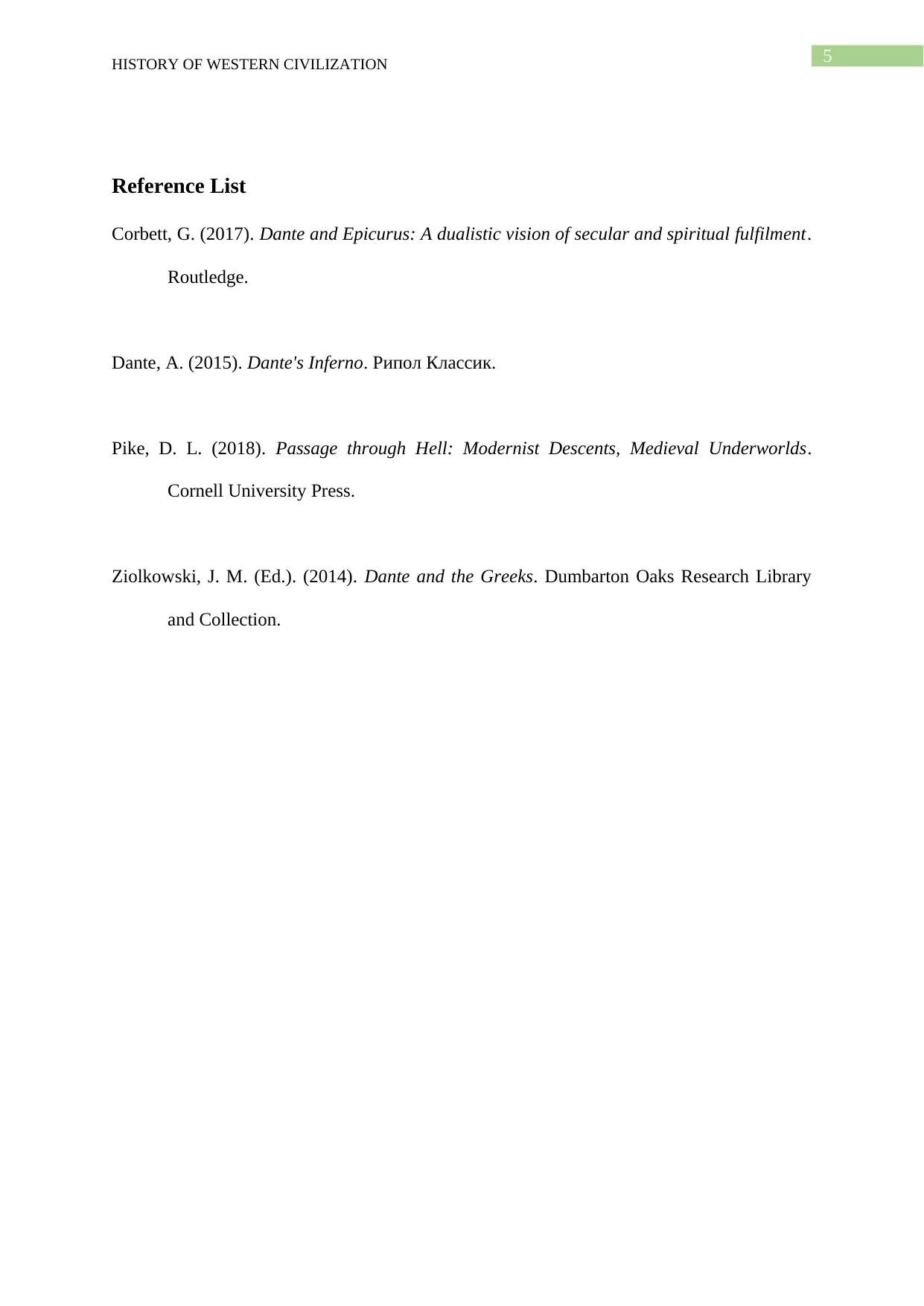
5HISTORY OF WESTERN CIVILIZATION
Reference List
Corbett, G. (2017). Dante and Epicurus: A dualistic vision of secular and spiritual fulfilment.
Routledge.
Dante, A. (2015). Dante's Inferno. Рипол Классик.
Pike, D. L. (2018). Passage through Hell: Modernist Descents, Medieval Underworlds.
Cornell University Press.
Ziolkowski, J. M. (Ed.). (2014). Dante and the Greeks. Dumbarton Oaks Research Library
and Collection.
Reference List
Corbett, G. (2017). Dante and Epicurus: A dualistic vision of secular and spiritual fulfilment.
Routledge.
Dante, A. (2015). Dante's Inferno. Рипол Классик.
Pike, D. L. (2018). Passage through Hell: Modernist Descents, Medieval Underworlds.
Cornell University Press.
Ziolkowski, J. M. (Ed.). (2014). Dante and the Greeks. Dumbarton Oaks Research Library
and Collection.
⊘ This is a preview!⊘
Do you want full access?
Subscribe today to unlock all pages.

Trusted by 1+ million students worldwide
1 out of 6
Your All-in-One AI-Powered Toolkit for Academic Success.
+13062052269
info@desklib.com
Available 24*7 on WhatsApp / Email
![[object Object]](/_next/static/media/star-bottom.7253800d.svg)
Unlock your academic potential
Copyright © 2020–2025 A2Z Services. All Rights Reserved. Developed and managed by ZUCOL.

